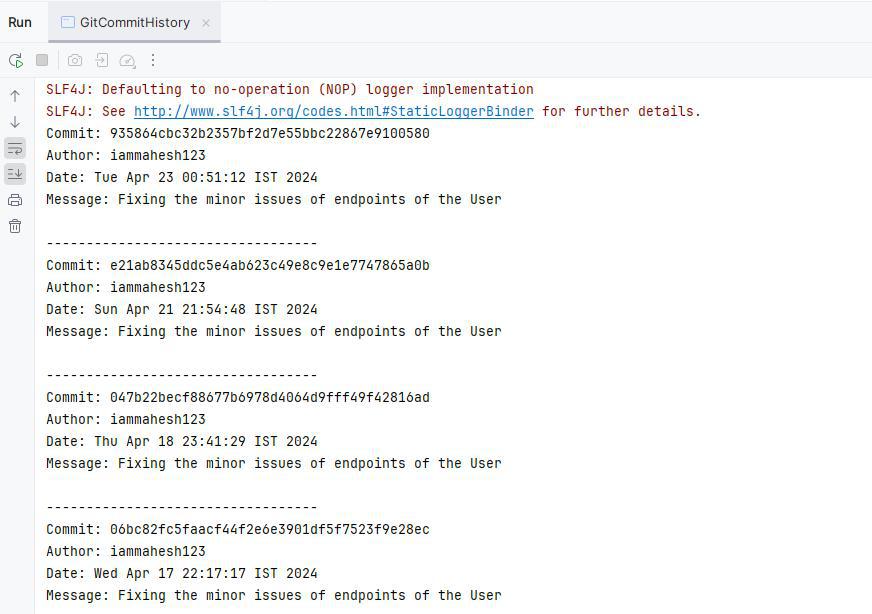|
JGit is an open-source and pure Java library that can implement the Git version control system. It can allow the developers to interact with the Git repositories programmatically and enable them to perform various Git operations such as cloning the repositories, creating the branches and viewing the commit history.
This article will guide you to focus on using the JGit to extract and display the repository’s commit history.
Prerequisites- Basic Knowledge of the Java and Git.
- Java Development Kit installed in your local system.
- Maven for building dependency management.
Main Concept: Opening and Interacting with the Git Repository using JGit- Repository and FileRepositoryBuilder Classes: JGit can provide these classes to locate and open the Git repository. The FileRepositoryBuilder can help in constructing the Repository object by specifying the path to the .git directory of the local repository.
- Git Class for Git Commands: The Git class in JGit can provide various methods to execute the Git commands. It can be used to retrieve the commit history.
- RevCommit Class: Each RevCommit object that can be represents the commit in the repository. It contains information such as the commit hash, author, date and commit messages of the repository.
Implementing the Extracting Commit History with JGitStep 1: Clone the Repositorygit clonet remote-repo-path Step 2: Create the Maven ProjectCreate the maven project using IntelliJ Idea. Once create the project then the file structure looks like the below image.

Step 3: Add the JGit DependencyOpen the pom.xml and add the below JGit dependency into the project.
<!-- https://mvnrepository.com/artifact/org.eclipse.jgit/org.eclipse.jgit -->
<dependency>
<groupId>org.eclipse.jgit</groupId>
<artifactId>org.eclipse.jgit</artifactId>
<version>6.9.0.202403050737-r</version>
</dependency>
Step 4: Create the GitCommitHistory Class
Java
package org.example;
import org.eclipse.jgit.api.Git;
import org.eclipse.jgit.api.errors.GitAPIException;
import org.eclipse.jgit.lib.Repository;
import org.eclipse.jgit.revwalk.RevCommit;
import org.eclipse.jgit.storage.file.FileRepositoryBuilder;
import java.io.File;
import java.io.IOException;
public class GitCommitHistory {
public static void main(String[] args) {
// Path to the local Git repository
String repoPath = "C:\\Users\\Mahesh\\Desktop\\jgit-commit\\E-Commerce-Backend-Spring-Microservices\\.git";
try {
// Open the repository
FileRepositoryBuilder builder = new FileRepositoryBuilder();
Repository repository = builder.setGitDir(new File(repoPath))
.readEnvironment()
.findGitDir()
.build();
// Access the Git log
try (Git git = new Git(repository)) {
Iterable<RevCommit> commits = git.log().call();
// Iterate over the commits
for (RevCommit commit : commits) {
System.out.println("Commit: " + commit.getName());
System.out.println("Author: " + commit.getAuthorIdent().getName());
System.out.println("Date: " + commit.getAuthorIdent().getWhen());
System.out.println("Message: " + commit.getFullMessage());
System.out.println("----------------------------------");
}
}
} catch (IOException | GitAPIException e) {
e.printStackTrace();
}
}
}
Pom.xml
XML
<?xml version="1.0" encoding="UTF-8"?>
<project xmlns="http://maven.apache.org/POM/4.0.0"
xmlns:xsi="http://www.w3.org/2001/XMLSchema-instance"
xsi:schemaLocation="http://maven.apache.org/POM/4.0.0 http://maven.apache.org/xsd/maven-4.0.0.xsd">
<modelVersion>4.0.0</modelVersion>
<groupId>org.example</groupId>
<artifactId>JGit-Commit-Demo</artifactId>
<version>1.0-SNAPSHOT</version>
<properties>
<maven.compiler.source>17</maven.compiler.source>
<maven.compiler.target>17</maven.compiler.target>
<project.build.sourceEncoding>UTF-8</project.build.sourceEncoding>
</properties>
<dependencies>
<!-- https://mvnrepository.com/artifact/org.eclipse.jgit/org.eclipse.jgit -->
<dependency>
<groupId>org.eclipse.jgit</groupId>
<artifactId>org.eclipse.jgit</artifactId>
<version>6.9.0.202403050737-r</version>
</dependency>
</dependencies>
</project>
Step 5: Run the applicationIt will show the below output. It will print the commit history of specified repository.

By the following these steps. we should be able to extract the commit history from any Git repository using the JGit. This article covers the setting up the environment, explaining the concept and providing the complete example to illustrate the process of extracting commit history with JGit.
|


